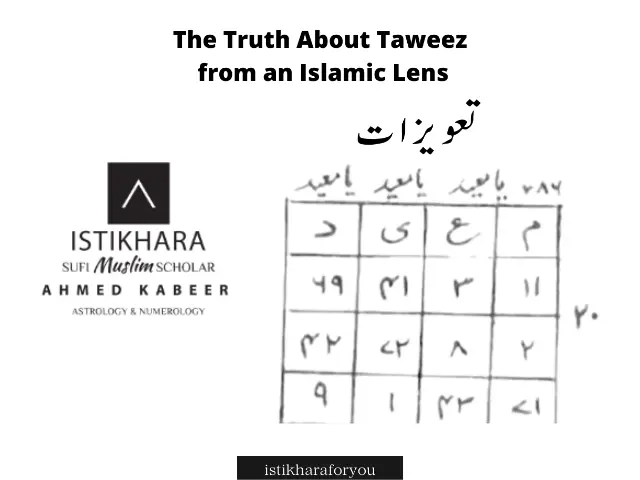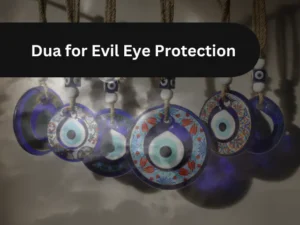You’ve probably seen those little amulet pouches that people wear around their necks or wrists. In some cultures, they’re called taweez. They usually contain verses from the Quran or special symbols thought to offer protection, healing, or good luck. But what does Islam really say about using taweez? Are they just harmless cultural traditions or something more sinister? As a Muslim, you may have wondered if wearing a taweez aligns with your faith or crosses into dangerous territory. In this article, we’ll explore the Islamic perspective on taweez so you can make an informed decision. We’ll look at evidence from the Quran and hadith, as well as the reasoning of respected scholars. You may be surprised at what we uncover. So if you’ve ever pondered the permissibility of taweez keep reading to discover the truth from an Islamic lens.
What Are Taweez and Their Origins in Islam
Taweez refer to amulets in Islam that contain verses of the Quran, names of Allah, numbers, and symbols. They are meant to protect or heal the person who wears them. The origin of taweez comes from pre-Islamic practices, but they were later adopted by some Muslims who believe they can serve as a legitimate form of spiritual healing and protection when the words and symbols are derived from the Quran.
However, the majority of Islamic scholars consider taweez to be a forbidden practice in Islam because they are a form of shirk (polytheism). They argue that taweez violate the core Islamic principle of tawheed (the oneness of God). By ascribing power to objects like amulets, some believe it compromises faith in Allah alone as the ultimate protector and healer.
Pre-Islamic Origins
The use of amulets and talismans was common in pre-Islamic pagan cultures in Arabia. These objects were thought to provide protection from evil spirits and bad luck. When Islam spread, some new Muslims continued these cultural practices by adopting Quranic verses and Islamic symbols in the amulets, believing they could serve the same purpose.
Difference of Opinion
There is a difference of opinion on taweez among Islamic scholars. Some permit them if the amulets contain only Quranic verses or the names and attributes of Allah. They believe these amulets can serve as a legitimate form of spiritual healing and protection. However, most scholars forbid taweez altogether based on the prohibition of shirk.
In summary, taweez find their origins in pagan pre-Islamic practices that were later adopted by some Muslims. However, most Islamic scholars consider taweez to be forbidden because they violate the Islamic principle of worshipping Allah alone. At their core, taweez are a form of shirk that compromises tawheed. While a minority of scholars permit certain types of taweez, the majority forbid them altogether based on clear evidence from the Quran and Sunnah.
The Islamic Ruling on Wearing Taweez Amulets
According to many scholars, wearing taweez amulets is forbidden in Islam. Taweez are believed to contain magic, astrology, and/or the invocation of jinn. All of these are strictly prohibited in Islam.
Magic and Astrology Are Forbidden
The Quran clearly forbids magic and astrology. Allah says: “And follow what the Shayateen (devils) falsely related against the kingdom of Solomon. Solomon disbelieved not; but the Shayateen (devils) disbelieved, teaching men magic.” [Quran 2:102]
Only Allah Can Bring Benefit or Harm
Wearing taweez amulets implies that they have the power to benefit or harm you, which is a form of shirk. Only Allah has the power to cause good or bad. The Prophet (peace be upon him) said: “Whoever wears an amulet has committed shirk.” [Ahmad]
Seeking Protection from Other Than Allah is Forbidden
Some people claim that taweez only contain verses of the Quran or words of remembrance (dhikr), so they are allowed. However, wearing them for protection implies you are seeking protection from the taweez itself, not from Allah. This is forbidden. We must seek protection only from Allah.
In summary, most scholars forbid wearing taweez amulets because they involve magic, astrology, shirk, and seeking protection from other than Allah. The only exception is if the amulet contains only verses of the Quran or dhikr, and the person does not believe it has any special protective power in and of itself. But in general, it is best for Muslims to avoid wearing any kind of amulets or talismans. Our protection is from Allah alone.
Dangers of Seeking Protection from Taweez Instead of Allah
Taweez are amulets believed to have magical powers of protection and healing. Many Muslims turn to taweez for help instead of relying on Allah. This is dangerous for several reasons.
Taweez Involve Shirk (Polytheism)
Seeking protection or help from anything other than Allah, such as taweez, is shirk. Allah says in the Quran, “And most of them believe not in Allah except that they attribute partners unto Him” (Quran 6:106). When you rely on taweez, you are attributing power and ability to the amulet that only belongs to Allah.
Taweez Have No Power
Taweez themselves have no power to protect or heal. Any perceived effects are due to psychological factors or the evil eye. Allah is the only protector. As He says in the Quran, “And if Allah touches you with harm, none can remove it but He” (Quran 6:17).
The Contents of Taweez are Often Kufr (Disbelief)
The writings or symbols inside taweez are meant to magically manipulate spiritual forces. This kind of magic is kufr as it implies that other spiritual beings besides Allah have power and influence. The Prophet (s) said: “Whoever wears an amulet, may Allah not fulfill his need, and whoever wears a sea-shell, may Allah not give him peace.”
Reliance on Taweez Shows Lack of Faith in Allah
Using taweez demonstrates a lack of complete faith and trust in Allah’s power. If you truly believe that Allah is the all-Powerful protector, there is no need for amulets. Allah says in the Quran: “And put thy trust in Allah. And enough is Allah as a Trustee” (Quran 33:3).
In summary, taweez are a dangerous practice that reflects a lack of faith in Allah as the sole protector. Seek refuge in Allah alone, who has power over all things. Taweez will only misguide you and take you further away from the straight path of Islam.
Stories of How Taweez Lead People Astray
So many people have fallen prey to the deception of taweez. They are lured in by false promises and end up hurt or led far from the path of Islam.
Amina’s Story
Amina was having trouble conceiving a child after many years of marriage. In desperation, she visited a spiritual healer who gave her a taweez to wear, claiming it would help her fertility. She noticed strange dreams and trance-like states, but she attributed them to the taweez and thought it must be working. After several months, she became pregnant, reinforcing her belief in its power. However, during her pregnancy she began having visions telling her to do acts of shirk like prostrating to the taweez. She realized with horror that it was leading her into kufr, not closer to Allah. She immediately removed it, repented, and sought refuge in Allah from its evil.
Zayd’s Story
Zayd suffered from anxiety and depression. A friend gave him a taweez from a spiritual guide, claiming it would relieve his worries and uplift his mood. At first, Zayd did feel better, but soon began having dark thoughts and strange mood swings. He would go into trances where he felt an evil presence around him. His condition worsened until he could barely function. A sheikh diagnosed that the taweez contained sihr (black magic) and was causing his symptoms. After it was removed and destroyed, Zayd began to recover with the help of Qur’an and dhikr.
These stories show how cunningly Shaytan can mislead people through taweez and sihr. Appearing as a means of help, they instead cut one off from Allah’s guidance and mercy. The only source of healing and protection is in the Qur’an and sunnah. Any other object of reverence or means of “intercession” can open the door to shirk and even kufr. The key is to rely only on Allah, and be wary of these deceitful tricks of Iblis which only lead people astray.
The Truth About Taweez and What Islam Really Says
Many Muslims believe taweez, or amulets containing verses from the Qur’an, will protect them from harm. However, the use of taweez is controversial in Islam. While some scholars argue it is permissible if the verses are from the Qur’an or the names of Allah, others say there is no evidence to support this in the sunnah (practices) of the Prophet Muhammad.
Taweez Are a Form of Shirk
Most scholars argue that taweez are a form of shirk, or the worship of anything other than Allah. They say that placing one’s faith in an object, rather than Allah alone, is forbidden. Only Allah has the power to cause harm or good, so taweez cannot protect or heal on their own. Some scholars argue that even if the verses or names are from the Qur’an, using them in this way diverts people from the true teachings of Islam.
There Is Little Evidence Taweez Are Permissible
There are few verified hadith that directly support the use of taweez. Some argue that a hadith about the Prophet allowing a taweez with verses from the Qur’an shows they are allowed, but others counter that this hadith is weak. Most scholars agree that the evidence for taweez is unreliable and does not outweigh clear Qur’anic prohibitions against shirk.
Intention And Faith Must Be in Allah Alone
Even if taweez use verses from the Qur’an, one’s faith and intention should be in Allah alone for protection or healing. The Qur’an itself has power because it is the word of Allah, not because it is written on a piece of paper. If one’s faith is in the taweez itself, rather than Allah, this is clearly forbidden in Islam. The consensus is that any practice leading to shrinking should be avoided.
While some Muslims continue to use taweez with the belief that they are helping in a time of need, the majority of scholars argue this practice has no basis in Islam and in fact constitutes shirk, which is strictly forbidden. If you feel you need protection or healing, turn to Allah alone with faith and trust in His power and mercy. This is the truth of taweez according to the teachings of Islam.
Conclusion
So there you have it. Taweez can be a complex issue in Islam. The truth is, not all taweez are created equal. Some contain Quranic verses or supplications to Allah, which may be permissible. Others have unknown writings or symbols, which are risky and best avoided. At the end of the day, put your trust in Allah alone. Seek proper Islamic knowledge. And if you choose to wear taweez, do so with care and caution. The most powerful talisman is faith in Allah, so nurture your daily through prayer, Quran, and remembrance. With an open and humble heart, you’ll stay firmly on the straight path.






